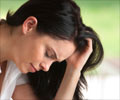- Advances in Psychiatric Treatment - (http://apt.rcpsych.org/)
About
‘For every disease we know Mother Earth provides a herb to health and grow.’
Mother Earth has provided herbs to cope with anxiety and depression ‘diseases’ as well. Anxiety and depression are the two most commonly reported psychiatric conditions and they generally occur together in a person. Both conditions are recurring or chronic and may require long term treatment.

Although conventional drug therapies for the disorders are easily available, financial, cultural, or personal reasons may cause the individual to seek alternative therapies. Herbs and herbal products may be slower acting than conventional drugs but they provide an inexpensive, effective way to treat the root cause of the disease rather than treat just the symptoms.
The following herbs are effective to a certain degree in reducing (sometimes curing) anxiety and depression.
Holy basil (tulasi, Ocimum sanctum) - Holy basil soothes and calms the nerves, according to the Indian traditional medicine. Research too has confirmed the fact that basil helps with anxiety disorders. For example, a study of 35 people given 500mg per capsule of tulasi twice a day for two months showed not only a significant reduction in their generalized anxiety disorders but attenuation of its correlated stress and depression too. No wonder, tulasi is one of the ingredients in Manasamitra Vataka, an Ayurveda formulation that treats anxiety disorders.
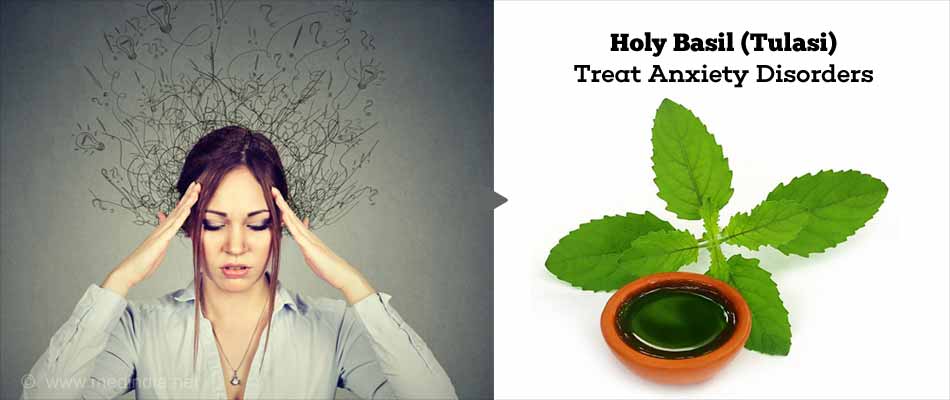
Kava (Piper methysticum) - Kava has also been proved effective in treating anxiety. Number of studies have shown anxiolytic (reducing anxiety) effects of kava to be superior to that of placebo. Actually, it is the only herb that is demonstrably effective in reducing anxiety. However, use it cautiously since kava has adverse effects such as liver damage. Kava is also known to interact with levodopa and alprazolam causing extrapyramidal symptoms or lethargy.
Lemon balm (Mellissa officinalis) - Also known as sweet balm, this lemon-scented herb is found worldwide. A study published in the 2004 issue of Psychosomatic Medicine revealed that lemon balm administered to people during gave short-term anxiolytic effects to them. A more recent study found that rosmarinic acid in the leaf extract gave the plant its anxiolytic and anti-depression effects. It acted by increasing the GABA levels in the brain thus reducing anxious behavior. The researchers of this study made an interesting observation; they found that the effect of lemon balm extract was significantly higher in female lab animals than in males. Males required the highest dose to have the same effect.
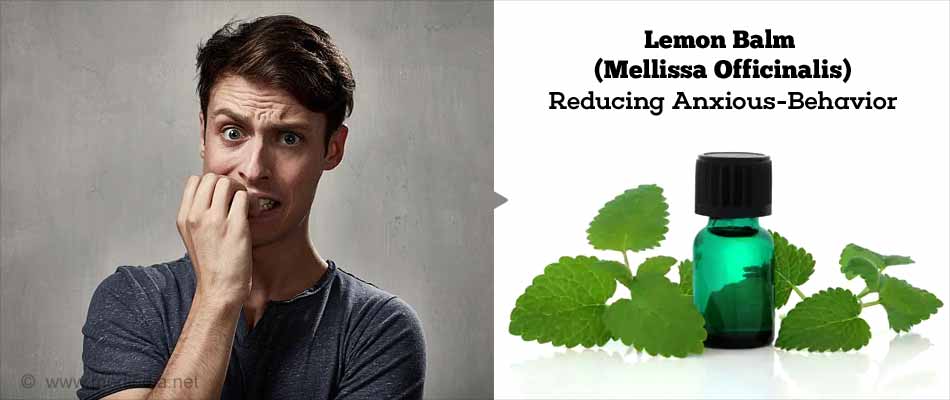
Passion flower (Passiflora incarnata) - Passion flower has been used since ages to reduce stress and anxiety. The whole plant except for the roots show anxiolytic activity. However, pharmacologic work on this plant are inadequate, so it is difficult to say how the herb acts to relieve anxiety.
Chamomile (Matricaria recutita) - Chamomile is used as a traditional herbal remedy for its calming effect since the ancient Rome and Greek period. Studies too have established its function as an anxiolytic and anti-depressive agent. The mode of antidepressant action in chamomile is unknown but it is known to be independent of anxiolytic action. Some studies suggest that the flavonoids in chamomile exert an antidepressant effect by modulating the neurotransmission of noradrenalin, dopamine, serotonin, and GABA levels.
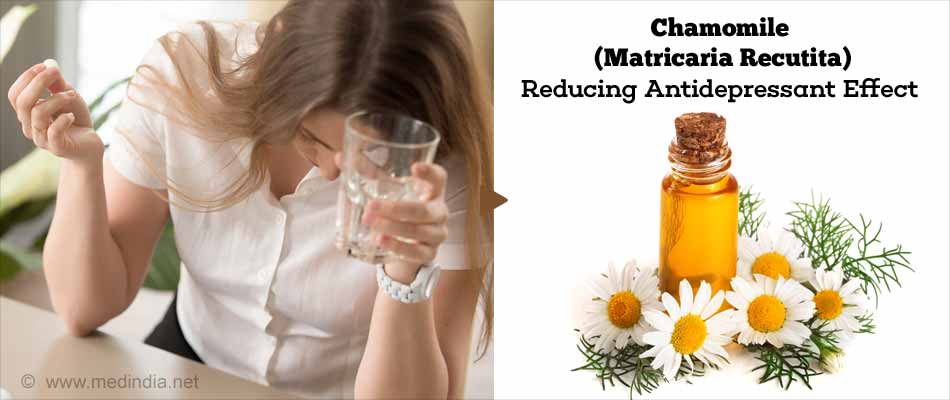
Ginkgo (Ginkgo biloba) - Also called the maiden hair plant, Ginkgo has been used in Chinese traditional medicine for treating various health disorders. The extract is particularly helpful with concentration problems, depression, anxiety, dizziness, tinnitus and headaches. The herb apparently works by dilating blood vessels to increase blood flow, reducing blood viscosity, reducing free radicals in the body, and also by modifying neurotransmitter systems. Although some studies reported beneficial effects of Ginkgo at doses of less than 200mg per day for 12 weeks with no side effects, big trials showed inconsistent results. Other studies reported no benefits as regards anxiety and depression.
Yarrow (Achillea millefolium) - Yarrow is a medicinal plant used in traditional medicine to treat gastrointestinal disorders, inflammation, Anxiety and insomnia. A study done to investigate the effect of yarrow on acute and chronic anxiety disorder indicated that the herb exerted anxiolytic effect at doses that did not alter locomotor activity. Its behavior was similar to that of diazepam.
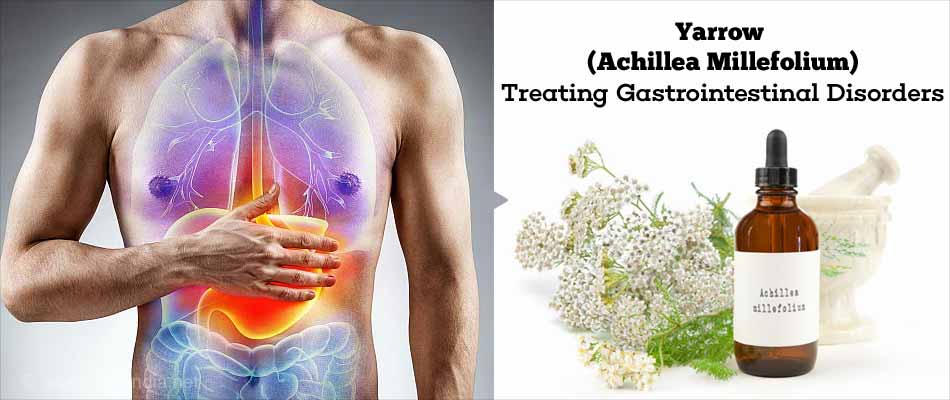
St. John’s wort (Hypericum perforatum) - St John’s wort is the only herb that has shown beyond reasonable doubt to be effective as a treatment for mild and moderate depression. The active ingredient for the herb is hypericin and /or hyperforin that act by inhibiting serotonin reuptake and monoamine oxidase. Five trials involving more than 2200 people showed that St John’s wort acts more or less in a similar fashion as conventional antidepressants. However, evidence suggests that the herb is safe only for people who don’t take any other medication. A study even showed that the herb can trigger psychoses in people who concomitantly take SSRIs (Selective Serotonin Reuptake Inhibitors).
Lavender (Lavendula angustifolia) - Lavender is also a promising herbal remedy for depression. Trials compared lavender with imipramine and found both to be effective in a similar way. In fact, lavender oil therapy (inhalation or massage) is a very effective way to counter depression. A trial to investigate the anti-depressive effect of lavender found that adjuvant therapy of lavender tincture (1 : 5 in 50% alcohol; 60 drops/day) and imipramine (100 mg/daily) in patients suffering from mild-to-moderate depression led to a better and earlier improvement. Side effects of imipramine, such as dry mouth and urinary retention, were observed less often when lavender was administered with impramine. Trials have also found lavender to improve mood and reduce anxiety.
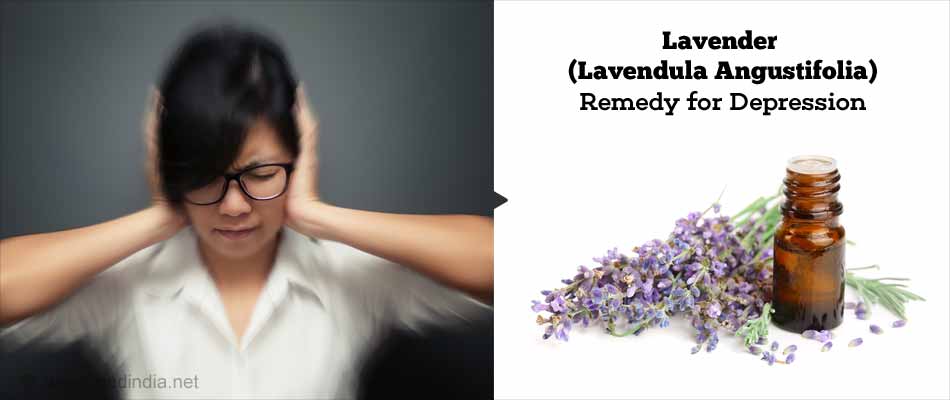
Saffron (Crocus sativus) - Widely cultivated in India (in Kashmir), Iran, and Greece, saffron is a useful remedy for a number of health disorders. The active ingredient, alpha-crocin, present in the red dried stigma of the herb is known to possess not only anxiolytic and anti-depressive qualities, but also has antihypertensive, anti-inflammatory, antioxidant, and relaxant activities and some studies even found tumoricidal properties. Studies have compared saffron to the antidepressive drug fluoxetine and found that saffron performed as well as fluoxetine in treating depression.
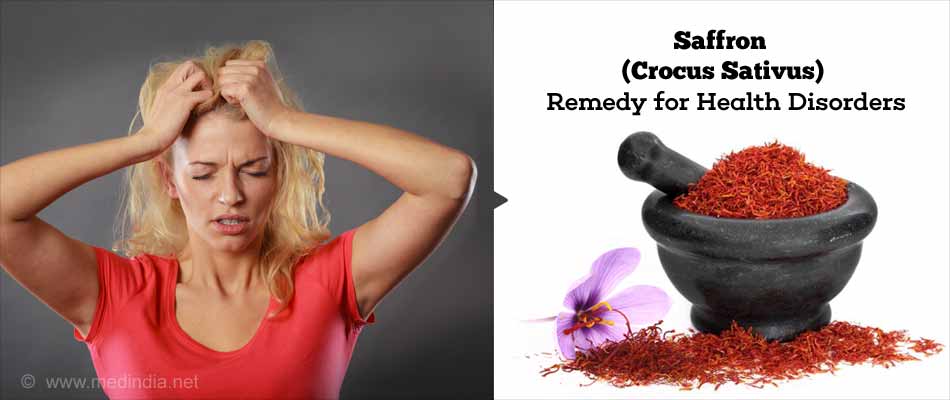
Borage (Echium amoenum) - A study in mice has shown that borage flowers have anxiolytic effect with lower sedative effect as compared with diazepam. Further, tolerance to the extract was not observed after one week of its use.


